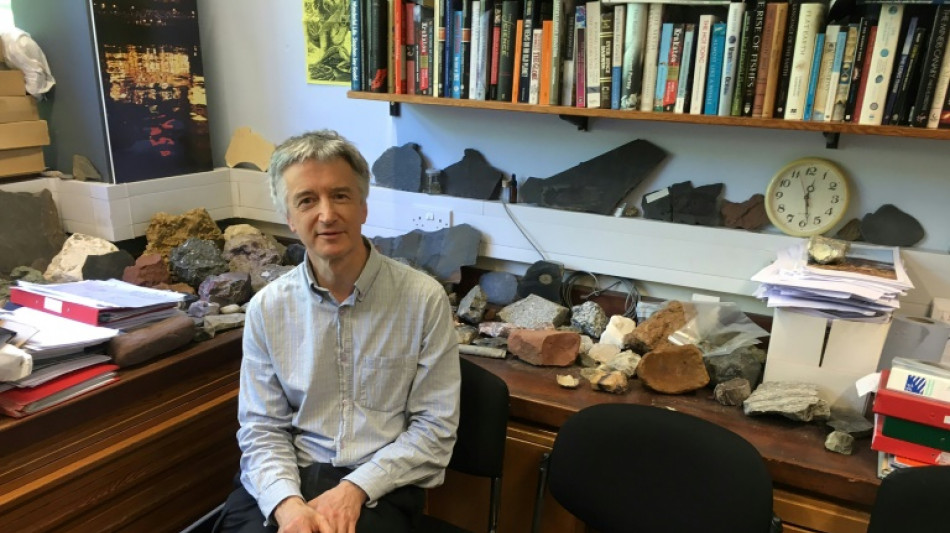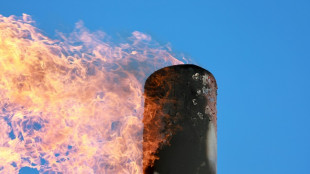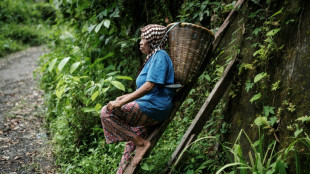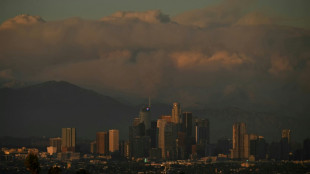
-
 Putin evokes WWII victory to rally Russia behind Ukraine offensive
Putin evokes WWII victory to rally Russia behind Ukraine offensive
-
China exports beat forecasts ahead of US tariff talks

-
 Leo XIV, the 'Latin Yankee', to celebrate first mass as pope
Leo XIV, the 'Latin Yankee', to celebrate first mass as pope
-
Most stocks lifted by hopes for US-China talks after UK deal

-
 IPL suspended indefinitely over India-Pakistan conflict: reports
IPL suspended indefinitely over India-Pakistan conflict: reports
-
German lender Commerzbank's profits jump as it fends off UniCredit

-
 Rare bone-eroding disease ruining lives in Kenya's poorest county
Rare bone-eroding disease ruining lives in Kenya's poorest county
-
India says repulsed fresh Pakistan attacks as de-escalation efforts grow

-
 Zhao's historic snooker title sparks talk of China world domination
Zhao's historic snooker title sparks talk of China world domination
-
'High expectations': EU looks to Merz for boost in tough times

-
 Poisoned guests rarely invited before deadly mushroom lunch, Australia trial hears
Poisoned guests rarely invited before deadly mushroom lunch, Australia trial hears
-
China sales to US slump even as exports beat forecasts

-
 Indian cricket to make 'final decision' on IPL over Pakistan conflict
Indian cricket to make 'final decision' on IPL over Pakistan conflict
-
Dethroned Bundesliga champions Leverkusen face uncertain future

-
 China can play hardball at looming trade talks with US: analysts
China can play hardball at looming trade talks with US: analysts
-
French monuments in trouble while PSG prepare for Champions League final

-
 Newcastle face Chelsea in top five showdown, Alexander-Arnold in spotlight
Newcastle face Chelsea in top five showdown, Alexander-Arnold in spotlight
-
Flick's Barca must show 'hunger' in crunch Liga Clasico

-
 Clasico the last chance saloon for Ancelotti's Real Madrid
Clasico the last chance saloon for Ancelotti's Real Madrid
-
Timberwolves overpower Warriors to level series

-
 Chinese fabric exporters anxious for US trade patch-up
Chinese fabric exporters anxious for US trade patch-up
-
Putin gears up to host world leaders at lavish army parade

-
 Nearing 100, Malaysian ex-PM Mahathir blasts 'old world' Trump
Nearing 100, Malaysian ex-PM Mahathir blasts 'old world' Trump
-
Leo XIV, first US pope, to celebrate first mass as pontiff

-
 Asian stocks lifted by hopes for US-China talks after UK deal
Asian stocks lifted by hopes for US-China talks after UK deal
-
Former head of crypto platform Celsius sentenced 12 years

-
 Ex-model testifies in NY court that Weinstein assaulted her at 16
Ex-model testifies in NY court that Weinstein assaulted her at 16
-
Nestlé and OMP Showcase Approach to Future-Ready Supply Chain at Gartner Supply Chain Symposium/Xpo in Barcelona

-
 Genflow Biosciences PLC Announces Share Subscription, Director's Dealing and Update
Genflow Biosciences PLC Announces Share Subscription, Director's Dealing and Update
-
Argo Blockchain PLC Announces 2024 Annual Results and Restoration of Listing

-
 'Great honor': world leaders welcome first US pope
'Great honor': world leaders welcome first US pope
-
Pacquiao to un-retire and fight Barrios for welterweight title: report

-
 Trump unveils UK trade deal, first since tariff blitz
Trump unveils UK trade deal, first since tariff blitz
-
Man Utd one step away from Europa League glory despite horror season

-
 Jeeno shines on greens to grab LPGA lead at Liberty National
Jeeno shines on greens to grab LPGA lead at Liberty National
-
Mitchell fires PGA career-low 61 to grab Truist lead

-
 AI tool uses selfies to predict biological age and cancer survival
AI tool uses selfies to predict biological age and cancer survival
-
Extremely online new pope unafraid to talk politics

-
 Postecoglou hits back as Spurs reach Europa League final
Postecoglou hits back as Spurs reach Europa League final
-
Chelsea ease into Conference League final against Betis

-
 Pope Leo XIV: Soft-spoken American spent decades amid poor in Peru
Pope Leo XIV: Soft-spoken American spent decades amid poor in Peru
-
First US pope shared articles critical of Trump, Vance

-
 'Inexcusable' - NBA champs Boston in trouble after letting big leads slip
'Inexcusable' - NBA champs Boston in trouble after letting big leads slip
-
US automakers blast Trump's UK trade deal

-
 Stocks mostly rise as US-UK unveil trade deal
Stocks mostly rise as US-UK unveil trade deal
-
Trump presses Russia for unconditional 30-day Ukraine ceasefire

-
 Anything but Europa League glory 'means nothing' for Man Utd: Amorim
Anything but Europa League glory 'means nothing' for Man Utd: Amorim
-
'Inexcuseable' - NBA champs Boston in trouble after letting big leads slip

-
 Pope Leo 'fell in love with Peru'and ceviche: Peru bishop
Pope Leo 'fell in love with Peru'and ceviche: Peru bishop
-
Pakistan's T20 cricket league moved to UAE over India conflict


How the weight of the world fell on one geologist's shoulders
In 1981, newly minted palaeobiologist Jan Zalasiewicz assumed he was headed for a discreet career retrieving and deciphering fossils from Earth's deep past.
For three decades the British scientist was, in his words, an itinerant geologist.
But then, curiosity and happenstance thrust him into the middle of a raging debate within science and beyond as to whether human activity and appetites have tilted our planet into a new geological epoch, the Anthropocene.
Zalasiewicz was tapped in 2009 by the International Commission on Stratigraphy (ICS) -- guardians of the timescale dividing Earth's history into segments such as the Jurassic and Cretaceous -- to chair a working group on the issue.
"I was ambushed by the Anthropocene, and then kidnapped without hope of release," he told AFP in an interview.
The working group has already concluded that the geological record shows a clear rupture in the stability of the Holocene epoch that began 11,700 years ago, and that it occurred around the middle of the 20th century.
Zalasiewicz pointed to an "embarrassment of riches" of evidence locked in ice cores, sediment and coral skeletons: microplastics, forever chemicals, traces of invasive species, greenhouse gases, and the fallout from nuclear bombs.
- Explosive change -
On Tuesday, the Working Group will announce which of nine candidate sites will get the "golden spike" signifying its status as ground zero for the Anthropocene.
Zalasiewicz's 15-years-and-counting Anthropocene odyssey was not what he signed up for.
"When I started geology, it was very much an escape from the complications of the world. You learn to live in the past," he said in an interview.
"Plunging into the Anthropocene, I hit all of this messy, complicated human life," he added. "It's a very abrupt change, and it's not a comfortable one."
But Zalasiewicz only has himself to blame.
Already in the late 1990s, he was intrigued by what human civilisation's fossil record might look like, leading to his first book in 2008, "Earth After Us: What Legacy Will Humans Leave in the Rocks?"
This made him an obvious choice to lead the Working Group, which he did until 2020. He is still a voting member.
For several years, it was assumed that the Anthropocene -- if it was really a thing -- would begin with industrialisation, but the geological markers just weren't there.
Around 2014, however, evidence of what Zalasiewicz called "explosive change" on a global scale concentrated around 1950 began to pour in.
One study in particular showing the planet dusted with fly-ash traceable only to burning coal and oil caught his eye.
"With the new bits of data clustered tightly around the mid-20th century, the Great Acceleration suddenly made sense -- things just clicked," he said.
- Overwhelming evidence -
Two non-geologists invited to join the Working Group -- chemistry Nobel winner Paul Crutzen, who coined the term Anthropocene in 2002, and climate scientist Will Steffen, both recently deceased -- had long championed that theory.
"The geologists were in fact catching up with the Earth system scientists," said Zalasiewicz, now an emeritus professor at the University of Leicester.
Today, Zalasiewicz is clearly worried about whether the Working Group's recommendations will survive the gauntlet of votes required for final validation. He's not optimistic.
"There is deep resistance to the idea of the Anthropocene, including from the most influential and powerful stratigraphers," notably the heads of the ICS and, above that, the International Union of Geological Science, both of whom have been vocal in their opposition, mostly on technical grounds.
"The artillery fire has been and continues to be heavy," Zalasiewicz added. "Validation has always been a long shot."
The concern, he continued, is how a failure to ratify would be interpreted by society at large, where the concept has tapped into a wider conversation about humanity's impact on the planet and what to do about it.
"People will say this is not happening, that the Anthropocene isn't real -- there are dangers involved in that," he said.
"It would give the impression that Holocene conditions" -- which have allowed humanity to thrive for thousands of years -- "were still here, which clearly they are not," he said.
"The weight of evidence for the Anthropocene as a new epoch to follow the Holocene is now overwhelming."
G.Stevens--AMWN


